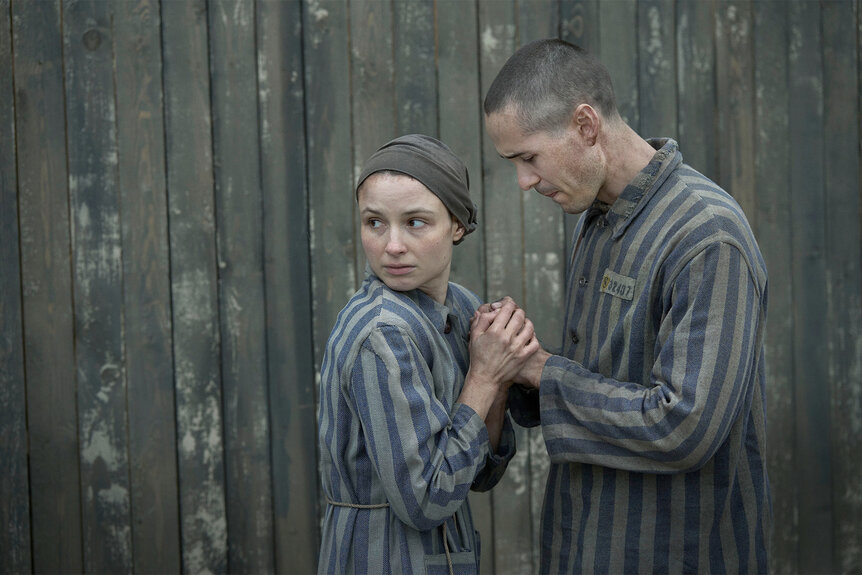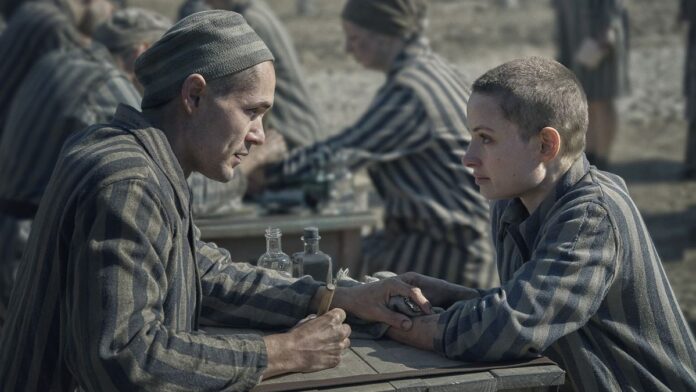In the haunting corridors of history’s darkest chapter, amidst the shadows of despair and the echoes of resilience, “The Tattooist of Auschwitz” stands as a beacon of love’s indomitable spirit. Peacock’s poignant drama, based on Heather Morris’s acclaimed novel, unravels the gripping narrative of Lali Sokolov and Gita Fuhrmannova, two souls entwined in an unyielding bond amidst the horrors of the Holocaust.

As the world grapples with the weight of remembrance and the perennial quest for hope, Barbra Streisand’s soul-stirring rendition, “Love Will Survive,” emerges as a melodic soliloquy, echoing the resilience of the human spirit and paying homage to the countless lives lost in the abyss of atrocity.
A Tale of Love Amidst Darkness
In the heartrending tapestry of “The Tattooist of Auschwitz,” love blossoms amidst the desolation of despair. Set against the backdrop of one of humanity’s darkest chapters, the series paints a poignant portrait of Lali and Gita, two souls ensnared in the brutal clutches of history. Forced into the harrowing confines of Auschwitz, Lali’s encounter with Gita ignites a flame of love that defies the shadows of oppression. Theirs is a story of unwavering devotion, a testament to the resilience of the human heart amidst the unfathomable cruelty of war.
Barbra Streisand’s Melodic Tribute
Amidst the haunting melodies that underscore the series’ narrative, Barbra Streisand’s “Love Will Survive” emerges as a luminous tribute to the enduring power of love. Penned by the acclaimed Charlie Midnight and adorned with Streisand’s ethereal vocals, the song serves as a poignant coda to Lali and Gita’s tale. With lyrics that resonate with profound emotion, Streisand’s ballad encapsulates the essence of hope amidst despair, paying homage to the indomitable spirit of those who perished in the Holocaust.
Echoes of Remembrance
As Streisand’s mellifluous voice reverberates through the closing moments of the series, “Love Will Survive” becomes more than a mere song; it becomes a solemn vow of remembrance. Streisand’s decision to lend her voice to this poignant tribute is a testament to her commitment to preserving the memory of the six million lives lost in the Holocaust. With each note, she weaves a tapestry of remembrance, ensuring that the voices of the past are never silenced amidst the tumult of time.

Fitting Tribute to Enduring Love
In the somber embrace of “The Tattooist of Auschwitz,” Streisand’s rendition finds its rightful place as a poignant ode to enduring love. As Lali reflects on the fragments of happiness amidst the ruins of war, “Love Will Survive” becomes a guiding light, illuminating the path towards redemption. Through the prism of Streisand’s haunting melody, the resilience of Lali and Gita’s love transcends the confines of history, echoing through the corridors of time as a testament to the triumph of the human spirit.
Conclusion: Resonating Echoes of Hope
In the hallowed annals of history, amidst the echoes of remembrance and the shadows of despair, “The Tattooist of Auschwitz” stands as a testament to the resilience of the human spirit. Through the lyrical prism of Barbra Streisand’s “Love Will Survive,” the timeless tale of Lali and Gita finds new resonance, echoing through the corridors of time as a luminous tribute to love’s enduring legacy. As we navigate the labyrinth of history, may Streisand’s melodic tribute serve as a beacon of hope, guiding us towards a future illuminated by the enduring promise of love’s survival.
